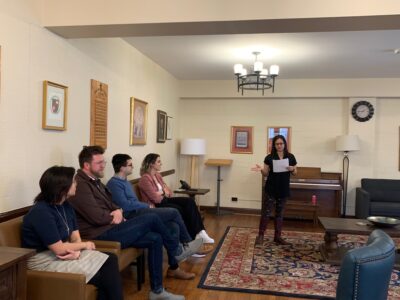On first glance, a doctoral student, a university administrator, a lawyer, and a high school teacher might not have a great deal in common on a day-to-day basis. But four alumni who came together recently to talk about life after graduating from the Christianity & Culture program at the University of St. Michael’s College were bound together by their respect for the program, as well as for the people teaching in it, noting that their studies gave them a unique lens through which to view the world.

An added dimension to the alumni panel, held in the Basilian Fathers Common Room, was the fact that three of the four participants went on to advanced theological studies, and so attendees were given a great idea of how C & C meshes with further theological studies, as well as what to expect at the graduate level.
Alumna Therese Hassan, for example, credits her time in both the Christianity and Culture program and St. Michael’s Faculty of Theology, where she earned a Master of Theological Studies degree, with helping prepare her more effectively to meet the needs of the secondary students she teaches today.
“Our students yearn for a connection to their faith and not every teacher they encounter has had the experience that I’ve had,” Hassan, who teaches for the Dufferin Peel Catholic School Board.
She describes her time at St. Mike’s as “super valuable,” allowing her students to have a different experience in her class because she is able to speak with confidence about topics such as the teachings of the Catholic Church and sensitive moral issues.
“My theology degree allowed me to grow and build on what I had learned in Christianity & Culture by taking a more in-depth look. And while my C & C classes were small and allowed me to participate, my theology classes were even smaller. I am confident that when my students tell me they have a different experience in my classes it is due to my own academic experience,” Hassan says. “Theology courses were so in-depth that they really allowed me to grow.”
Patrick Nolin, a graduate of the Christianity & Culture program now engaged in doctoral studies at Regis College also cites small classes as helping him become more involved in his classes – an area of study, incidentally, in which he had never intended to become so engaged.
“I didn’t know I’d join C & C because I was into history in high school and that was my planned major but then I took a first-year seminar course on Catholicism and that was it, hook, line, and sinker,” he laughs.
One of the aspects of the program he really appreciated was how its interdisciplinary nature helped create new lines of study, noting, for example, the growth in eco-theology that has taken place since the days he first encountered the subject area in his undergraduate years.
“Christianity & Culture taught me to figure out what questions that need to be asked,” he said, adding he often uses the transferable skills gained in his undergraduate years. Communicating to a small group, for example, has been a help both the past work in sales and his current life as a doctoral student.
Panelist Andrea Nicole Carandang found herself unable to imagine the experience of many of her university peers, who spoke of impersonal classes of 300 students, given the seminar-like size of many of her C & C classes. There, she found the ability to enter into conversations with her professors and her peers, allowing her to gain the confidence to debate respectfully and to tackle life’s most challenging questions.
She recalls, for example, that in 2015 when the Truth and Reconciliation Commission report came out, she was struck by an awareness that, “My faith was big part of the residential school system,” she says.
But she adds, as she delved deeper into the impact of the TRC report she comfort in a lesson she says she had learned again and again as a C & C student.
“It’s not wrong to ask hard questions,” she says.
Carandang, who returned to Toronto to work on a Master of Divinity degree at Regis College, says she often uses the skills and experiences gathered in her student years in many ways in her current role as Administrative Assistant in the office of the President of Regis College, from the practical work of doing research through to brainstorming to resolve numerous challenges that arise.
C & C grad Adam Giancola, who is now a lawyer, says “education is for life,” adding that an interest in canon law from his C & C days, for example, was one of the factors that played into his decision to go to law school.
He deeply values the time taken in his C & C classes to study what the church has proposed about issues over the centuries.
“It’s a program of looking at human issues and I do this every day,” says Giancola, who has worked for Ontario’s Office of the Children’s Lawyer as well as the Office of the Public Guardian and Trustee, offices designed to protect the legal, personal, and financial interests of people who face potential vulnerabilities at the hands of others.
Today, Giancola works in private practice but often engages on matters involving children and other vulnerable clients.
Thanks in part to his Christianity & Culture studies, he says he has learned to “look at people with charity and mercy. I exercise prudence and judgment. Christianity & Culture prepared me for life.”
(Above photo L-R: St. Mike’s alumni: Andrea Carandang, Patrick Nolan, Adam Giancola, Therese Hassan and RSM Theology Recruitment and Enrolment Officer Erica Figueiredo.)
For more information about St. Mike’s Christianity & Culture program, including queries about enrollment and completion, contact smc.programs@utoronto.ca.
For information about Regis St. Michael’s Faculty of Theology programs, email inquiry.usmctheology@utoronto.ca.
